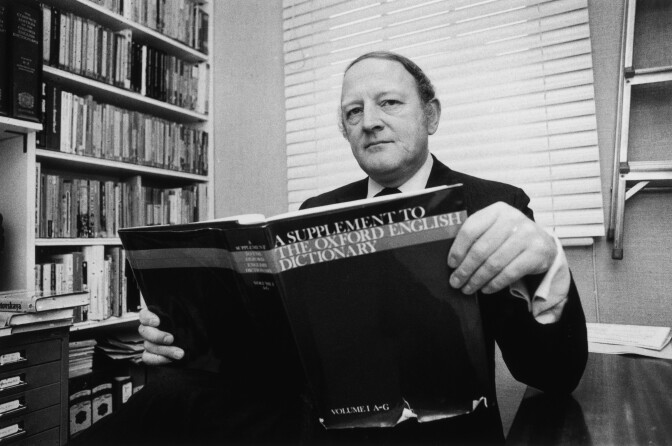This story is free to read because readers choose to support LAist. If you find value in independent local reporting, make a donation to power our newsroom today.
This archival content was originally written for and published on KPCC.org. Keep in mind that links and images may no longer work — and references may be outdated.
Why Oxford adds cray words like 'douchebaggery' to the dictionary

If your craydar's going ballistic, maybe it's because words like "douchebaggery," "amazeballs," "humblebrag" and "mansplain" have been added to the dictionary.
Those words are among the latest batch to be officially blessed by Oxford Dictionaries, the company behind that venerable chronicler and protector of the English language, the Oxford English Dictionary.
Oxford Dictionaries adds new words every quarter. Among other recent additions is the now-ubiquitous "selfie," which was added to the OED in June. Before that, it was Word of the Year.
So why do lexicographers bless words like "selfie" while ignoring its wonderfully descriptive cousins? Why not selfiebombing or, better yet, someoneelsie?
Why these words? Why now? Are lexicographers gradually becoming mere wikipedants? Good questions, all.
"For every new dictionary or online update we assess all the most recent terms that have emerged and select those which we judge to be the most significant or important and those which we think are likely to stand the test of time," goes the explanation given in a video from Oxford.
As easy as it may be to poke fun at serious institutions for giving serious weight to words we thought were just whimsical one-offs before they went viral, there is not only precedent, but indeed a need, for this practice.
The language is changing fast nowadays, and like most if not every other industry, lexicography — the practice of compiling dictionaries — is being disrupted by digital technology.
Here's more on how, and why, Oxford goes about selecting new words for inclusion, and how the process has sped up in recent years:
Compare that to a video posted just three years ago that explains (in a little more detail) how words make it into the Oxford English Dictionary:
Listening to audio recordings and poring over printed texts, yes, but now mostly Internetting, researchers watch for new words or new trends in the way current words are used. They flag and store whole chunks of language in the Oxford English Corpus, drawing on novels, journals, newspapers, magazines and even blogs, emails and social media to help make the case that words and their ever-evolving connotations and denotations are legit.
The corpus has quickly grown into a 2.5-billion-word trove of 21st century English, "with new text being continuously collected," says Oxford.
As explained in the video above, it used to take two to three years for a new term to be formally included.
"In today's digital age, the situation has changed," the Oxford woman explains. "New words like 'selfie' can achieve enormous currency with a wide audience in a much shorter space of time."
Now, due diligence aside, let's have some fun.
No one can really predict whether "selfie" will stand the test of time, let alone cutesy abbreviations like "vax." "Binge-watch," sure. Do we really need "acquihire?" Let us know in the poll below what dictionary addition you think most deserves to be yanked.
While you're at it, what words do you think should be on Oxford's radar? Let us know in the comments, or hit us up on Facebook or Twitter. Here are a few ideas to get you started: whappened, cyberbaiting, deepfave, technocamping, bropinion.
Now I'm off to dunch. (Btw, this entire post was a Mobile Moment.)
Which of these Oxford additions would you MOST like to see go away? (poll 8248649)
KPCC's online polls are not scientific surveys of local or national opinion. Rather, they are designed as a way for our audience members to engage with each other and share their views. Let us know what you think on our Facebook page, facebook.com/kpcc, or in the comments below.







